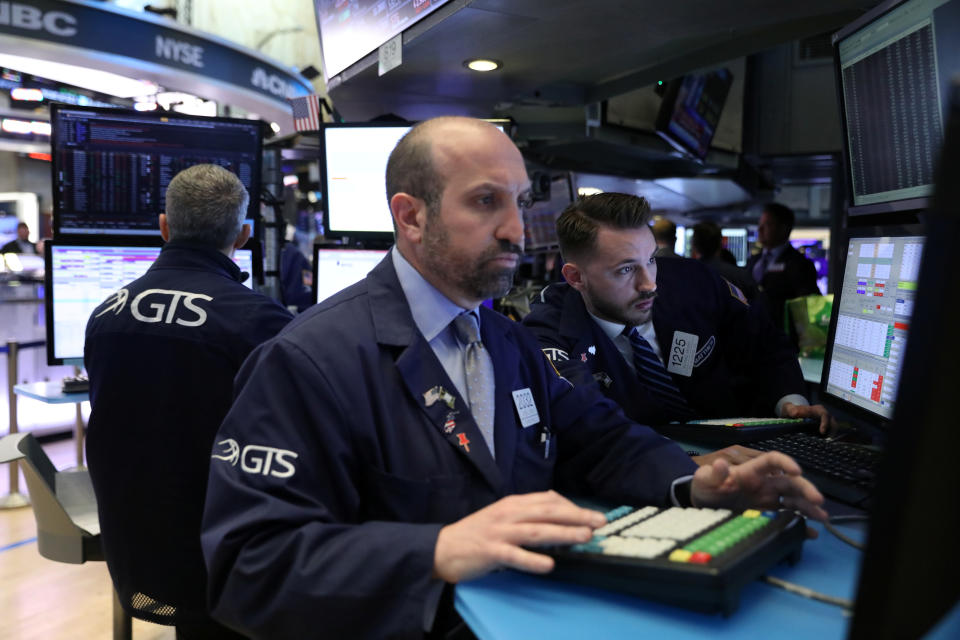Stock market news: August 9, 2019
Stocks started the trading session lower, after President Donald Trump dampened hopes for a U.S.-China trade deal. The president told reporters that the U.S. would not do business with Huawei, and the trade talks that were scheduled for September might not happen. The Dow was down as much as 280 points.
However, stocks recovered much of those losses in afternoon trading. Here’s where the markets closed:
S&P 500 (^GSPC): -0.6%, or -19.4 points
Dow (^DJI): -0.3%, or -90.7 points
Nasdaq (^IXIC): -1.0%, or -80.0 points
10-year Treasury yield (^TNX): +1.8 bps to 1.734%
Crude oil (CL=F): +3.4% to $54.35 per barrel
It has been a tumultuous week for the markets, as the trade war, and now currency war, rages on between the U.S. and China. The People’s Bank of China (PBOC) set the yuan’s daily fixing at 7.0136 per U.S. dollar on Friday. This move was the second time this week that the official reference rate was weaker than 7, and the rate was the weakest since April 3, 2008. Nevertheless, Friday’s yuan rate was still stronger than what analysts were expecting.
The yuan has been on market watchers’ radars after the yuan weakened past the key psychological level of 7-per-dollar on Monday. That send markets into a frenzy, and stocks posted their worst day of 2019. It has been a choppy trading week since, as more uncertainty gets pumped into the market.
Meanwhile, crude oil is also in focus after the International Energy Agency (IEA) reported on Friday that demand growth is at its lowest level in over a decade. The agency noted that global oil demand growth in the first half of this year was the slowest since the financial crisis. With China being the only major source of growth, the IEA lowered its global demand forecast to 1.1 million barrels per day for 2019 and 1.3 million barrels per day for 2020.

Huawei is grabbing the attention of investors after announcing that it has launched its own operating system called HongmengOS, or HarmonyOS in English. CEO of Huawei’s consumer division, Richard Yu, made the announcement at the Huawei Developer Conference. This new operating system allows Huawei to be less reliant on Google’s (GOOGL) Android. Google’s parent company, Alphabet, stock was lower in early trade.
Investors are also keeping an eye on ride-sharing companies Uber (UBER) and Lyft (LYFT). Uber’s weaker-than-expected second quarter earnings sent the stock tumbling 6%. Adjusted sales were worse than what analysts were expecting, and Uber reported a shocking $5.24 billion net loss in the second quarter. That was Uber’s largest quarterly net loss ever. Uber’s report comes on the heels of Lyft’s much better-than-expected results. Gross bookings in the second quarter also fell short of expectations at $15.76 billion. Analysts expected $15.83 billion in gross bookings. Uber posted an adjusted EBITDA loss of $656 million, which was a 25% decline from last quarter.
“Our platform strategy continues to deliver strong results, with Trips up 35% and Gross Bookings up 37% in constant currency, compared to the second quarter of last year,” CEO Dara Khosrowshahi said in a statement. “In July, the Uber platform reached over 100 million Monthly Active Platform Consumers for the first time, as we become a more and more integral part of everyday life in cities around the world.”
Uber expects between $65 billion to $67 billion in gross bookings this year and expects adjusted EBITDA losses between $3.2 billion to $3 billion. The company did not give an adjusted net revenue forecast. Khosrowshahi also noted that Uber would be upping its marketing spend despite having cut 400 market employees recently. The question among investors remains whether or not Uber can continue its growth while attempting to simultaneously achieve profitability.
—
Heidi Chung is a reporter at Yahoo Finance. Follow her on Twitter: @heidi_chung.
More from Heidi:
Read the latest financial and business news from Yahoo Finance
Follow Yahoo Finance on Twitter, Facebook, Instagram, Flipboard, LinkedIn, and reddit.


